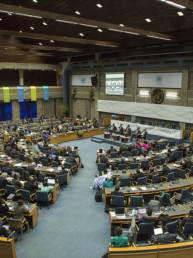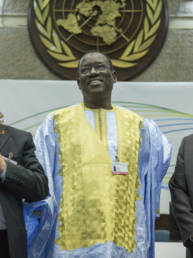UNEA
A Global Symposium on Environmental Rule of Law Summary and Key Messages
On the occasion of the first session of the United Nations Environment Assembly, ‘Environmental Justice and Sustainable Development – A Global Symposium on Environmental Rule of Law’ invited Chief Justices, Attorneys General, Judges, Chief Prosecutors, Auditors General, leading legal scholars, practitioners and experts to discuss the ways and means by which the further development and implementation of environmental rule of law can help ensure just and sustainable development outcomes.
The Symposium was organized by UNEP in partnership with the Organization of American States (OAS), the Africa Sustainability Centre (ASCENT) and the IUCN World Commission on Environmental Law. It was delivered in two sessions. The first session, following official opening remarks by the Deputy Chief Justice of Kenya, explored different aspects of Environmental Rule of Law and Sustainable Development, such as public participation, human rights and accountability. The second session dealt with criminal, civil, and administrative enforcement in the context of environmental rule of law.
〰
During this Symposium, its participants provided insights into the importance of the environmental rule of law for sustainable development and environmental justice. They concluded that there were many examples from around the world that underlined law, coupled with strong institutions to implement it, as essential for societies to respond to increasing environmental pressures in a way that respects fundamental rights and principles of fairness, including to future generations. The rule of law was therefore critical for the success of both, the achievement of sustainable development objectives and environmental goals, including a green economy.
Participants gave examples of how, in the absence of environmental rule of law, key objectives of environmental governance could not be realized. Achieving public participation in decision-making and transparency as well as accountability of all persons, institutions and entities, public and private, including the State itself, were identified as reliant on the supremacy of the law, embodied by environmental rule of law. Through publicly promulgated and adequate environmental laws, which are equally enforced and independently adjudicated, the environmental rule of law could ensure accountability to the law, fairness in the application of the law, separation of powers, participation in decision-making, respect for human rights – and deliver environmental justice.
〰
Participants also expressed a strong concern about the rise of criminal and other illegal activities that impact negatively on environmental justice, natural resources and sustainable development. They cited the illegal exploitation of natural resources, highlighted by the surging illegal trade in wildlife, as having impacts not only on the environment but on peace and security, national economies, and involving sophisticated international criminal syndicates. To combat these offences, the attending Chief Justices, Attorneys General, Judges, Chief prosecutors, Auditors General, leading legal scholars, practitioners and experts, discussed matters of legal standing, the rights of nature, and called for the strengthening of capacities across the entire enforcement chain to bolster environmental enforcement through criminal, civil and administrative avenues. In doing so, participants made reference to the many good practices from around the world resulting from the work of individuals and institutions that are involved in the enforcement of environmental law.
The Symposium concluded with the formulation of key messages. These messages, in which participants called upon their peers and the global community to move forward in making environmental rule of law a reality for all by realizing its intrinsic value for environmental justice and sustainable development, are intended to inform the debates at the first UNEA and beyond:
〰
1. Environmental Rule of Law is indispensable for sustainable development. Its further development and implementation will help to ensure just and sustainable development outcomes.
2. Law, coupled with strong institutions to implement it, is essential for societies to respond to increasing environmental pressures in a way that respects fundamental rights and principles of fairness, including to future generations.
3. Only through environmental rule of law can conditions be established under which justice and respect for environmental obligations arising from treaties and other sources of law can be maintained.
4. The basis for Environmental Rule of Law is the adherence to environmental law, constitutional rights to a healthy environment and human rights. These obligations must be binding on all persons, institutions and entities, public and private, including the State itself.
5. During the past decades environmental laws have seen a growing acceptance and advancement on the international, regional and national level, including procedural rights which provide an important mechanism for ensuring environmental justice, accountability and transparency. However, their ideals and benefits still remain a distant reality for many.
6. Through publicly promulgated and adequate environmental laws, which are equally enforced and independently adjudicated, the environmental rule of law reduces corruption, ensures accountability to the law, fairness in the application of the law, separation of powers, participation in decision-making, respect for human rights – and delivers environmental justice.
7. The illegal exploitation of natural resources, and especially the surging illegal trade in wildlife, is a growing concern. It highlights the importance of environmental rule of law and has impacts not only on the environment but on peace and security, national economies and involves sophisticated international criminal syndicates.



